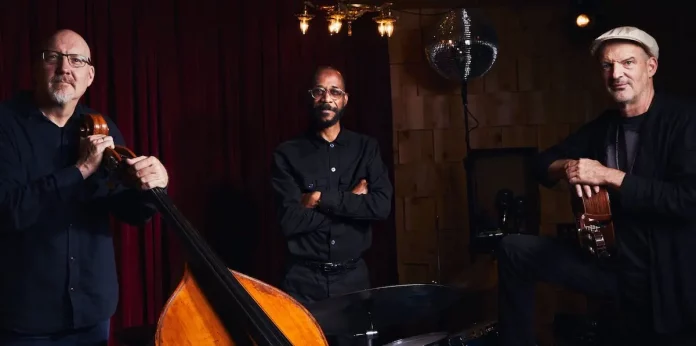Shri: Singing Bass (DTBASS008)
Released on all digital platforms via Drum The Bass, Singing Bass is a patient yet probing, naked yet multi-dimensional solo recording from the award-winning Shrikanth Sriram, better known as Shri. As documented in my March 2020 profile of the Bengaluru-born, Mumbai-raised and Croydon-domiciled electric bassist and multi-instrumentalist, composer and producer, Shri long ago abandoned any attempt to become the next Jaco Pastorius. Instead, he has developed a most personal art, rooted as much in factors of reverie as (subtly turned) groove and delivered with a bass sound of resonant, even mytho-poetic quality, as cutting as it is sustained and mellifluous.
The eight-piece, c. 43-minute programme, which draws sensitively on loops and effects and also features tabla and bansuri flute, is characterised by Shri as focused on the bass as a melodic instrument, the music being “the result of self-exploration to achieve a dreamy escape from the realities of today’s world, to a space of … hope?”
I think it was Yeats who said that in dreams begin responsibilities. Long committed to projects involving cross-cultural and cross-genre collaboration – exemplified by the work of the Croydon Composers project set up by Shri’s wife Shirin in 2017 – such a commitment gained Shri international acclaim with his The Letter, released in 2020 on Bugge Wesseltoft’s Jazzland label. Featuring Shri with Wesseltoft (kyb), Tore Brunborg (ts), Ben Castle (ts, bcl), Arild Andersen (b) and Paolo Vinaccia (d) the world-bridging music led to a sold-out gig at Ronnie Scott’s, covered in the aforementioned March 2020 profile. One thinks also here of his earlier major project Shri – Just A Vibration, where Indian classical and street music came together with northern brass-band traditions, and which won him a British Composers Award.
Singing Bass will surely confirm and enhance Shri’s reputation as one of the most exploratory, thoughtful and passionate musicians around today. Here is music of both sublimated groove (sample Stride) and spacious reflection (the bansuri-led Peace), featuring a characterful and diverse yet sequentially integrated range of melody and mood, rhythm and repose. The arresting whole melds impeccable intonation and overall musicianship (hear the command of soaring harmonics in the initial stages of Hilltop or the sustained potency of the arco lines in Strong Gentle Wise) with the most welcome aural and poetic sensitivity. Bravo!
Wolfgang Muthspiel, Scott Colley, Brian Blade: Tokyo (ECM 784 9955)
What is there left to say about the artistry of Muthspiel and a sensibility which is open both to Django Reinhardt and J.S. Bach, Kurt Weill and Keith Jarrett? Tokyo, Muthspiel’s latest – and excellent – release on ECM, features the Austrian acoustic and electric guitarist together with Colley (b) and Blade (d), eminent fellow-members of Muthspiel’s long-established trio.
Some may prefer the more richly voiced work of earlier ECM Muthspiel quintet achievements like Rising Grace (2016) and Where The River Goes (2018) to the leaner ambiance of previous trio dates with Colley and Blake such as Angular Blues (2020) and Dance Of The Elders (2023). But whatever the setting, you can be sure that Muthspiel’s fluid, dynamically adroit capacity for the interplay of the linear and the chordal, the quietly finger-picked and the ringing resonance of beautifully inflected single notes will deliver music of consummate, melodically appealing character.
DownBeat reviewer Howard Mandel once characterised Angular Blues as “a well-played record; not earthshaking, innovative or especially challenging, but sure to interest guitarists and guitar aficionados”. But is it only earth-shaking, innovative or especially challenging music that merits broad appeal? The literate and lovely Tokyo – one of the “jazziest” ECM releases for some while – would suggest not.
Muthspiel can crank up his sound to a near-rock dimension (hear the concluding Abacus) as well as sustain the sort of groove that would surely draw the biggest smile from Pat Metheny (Roll and Strumming). But he’s also able to dig back into jazz history: Tokyo begins with a sprightly take on Jarrett’s Lisbon Stomp, from the 1967 release Life Between The Exit Signs with Charlie Haden and Paul Motian. Throughout a recital which has its fair share of reflective pieces (Pradela, Christa’s Dream, Traversia and Weill You Wait) the quality of the ego-less, finely tuned group interaction is such as to make one realise why the work of this ensemble has precipitated comparisons with the long-classic trio of Bill Evans, Scott LaFaro and Paul Motian. Enjoy!

